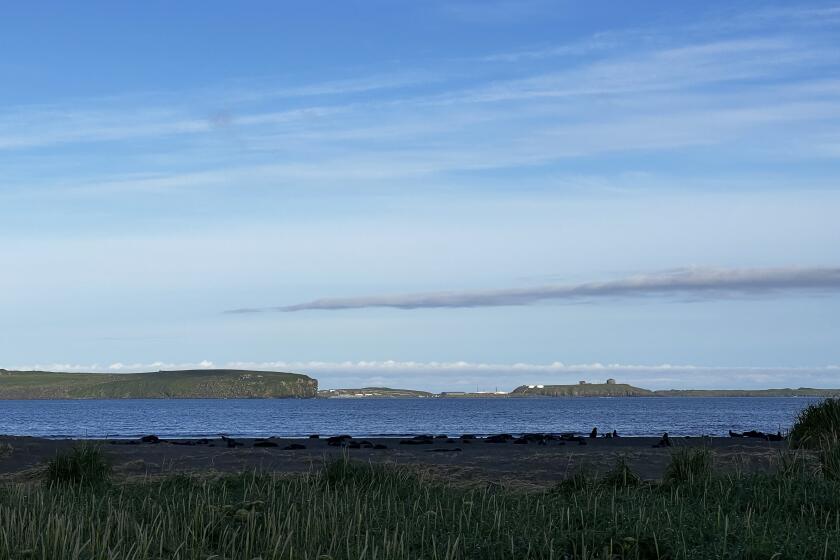Education Used as Weapon Against ‘Bush Meat’
Ask the villagers here, and they are unanimous: They hunt monkeys and other animals to feed their families, selling only the occasional catch to people passing through this part of west-central Africa.
Villagers blame the declining numbers of monkeys, antelope-like duikers and other creatures squarely on commercial poachers who supply wild meat, known as bush meat, to consumers in the cities and, to a surprising extent, around the world.
“I’m worried,” said Olivier Minko, who has noticed a decline in the number of animals in the last decade. “We’re trying to conserve what’s in the forest. My great-grandparents did not finish the bush meat. That’s why we’re trying to preserve the meat, so our children and their children” can hunt as well.
But hunters like Minko are part of the problem, say wildlife advocates and experts. Subsistence does not mean sustainability, and over-hunting in this region has led in many places to a phenomenon known as “empty forest” syndrome.
“You’re talking about human population levels that far exceed anything this planet has ever seen,” said Heather Eves, director of the Bushmeat Crisis Task Force in Washington. “While their ancestors may have carried on with a certain behavior pattern, that doesn’t mean it’s going to be able to continue in this day and age.”
The Wildlife Conservation Society estimates that a million metric tons of bush meat are taken from African forests every year. Another study puts consumption at 10 ounces a day per person. Jane Goodall, the well-known primate expert, warned in June that gorillas, chimpanzees and orangutans were being “eaten into extinction.”
Logging roads have opened up areas previously inaccessible to hunters, and growing urbanization provides a ready market. There is also worldwide demand from African expatriates.
UC Berkeley conservation ecologist Justin Brashares found that 13,000 pounds of bush meat a month move through underground markets in New York, London, Brussels, Paris, Toronto, Montreal and Chicago.
The Wildlife Conversation Society is involved in projects in Cameroon and the Democratic Republic of Congo to allow hunting in some areas while putting others off-limits. But even opponents of bush-meat hunting acknowledge the powerful motivation behind it.
“If you have to eat today because there are no other alternatives, either for money or for actual protein, those are the decisions people are going to make,” Eves said.
In the case of Mbong and neighboring villages, the lack of alternative food sources explains why the Cameroonian authorities permit bush-meat hunting within limits, said Alain Etom, a government “eco-guard” who monitors hunting in the area.
Animal husbandry requires land and feed that most villagers lack. And tsetse flies can infect cattle with trypanosomiasis, a fatal disease.
Etom is supposed to educate villagers about what they can hunt. Some species -- chimpanzee, gorilla, elephant, giant pangolin, mandrill -- are banned to hunters. Others require prior government approval, and many others can be hunted within limits.
Hunters once used slingshots and bows and arrows. Now, most use guns. By law, the hunters must register their guns and pay a kill fee, requirements that are rarely followed.
A powerfully built man who wears a military-style uniform and tan beret, Etom is also supposed to arrest poachers and patrol the forest. He knows commercial poaching gangs operate nearby, but he seldom has gas for his motorbike, and his territory extends 30 miles in one direction.
“It’s difficult to control,” he said, “for the simple fact that I’m alone.”
Johns Hopkins University public health researchers believe their work can help.
Epidemiologist Nathan Wolfe has shown that the hunting of monkeys and apes carries greater risks than was previously known and that viruses continue to jump from primates to people, as HIV did decades ago.
Wolfe and his fieldworkers do not actively campaign against bush-meat hunting, but they warn hunters of the dangers. And Wolfe thinks those warnings eventually may do more to curb primate hunting than simply saying no.
In a paper to be published this November in the journal Animal Conservation, Wolfe and ecologist Matthew LeBreton report that people who perceived risk were much less likely to butcher wild animals than those who saw no risk. Although that response does not extend to hunting itself, they conclude that greater health-risk education could also lead to less hunting.
“Instead of asking people not to hunt because of the theoretical benefits associated with animal conservation -- an approach that hasn’t been too successful,” Wolfe says, “we give them real information about how hunting can be harmful to them as individuals.”
More to Read
Sign up for Essential California
The most important California stories and recommendations in your inbox every morning.
You may occasionally receive promotional content from the Los Angeles Times.










